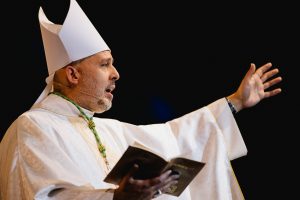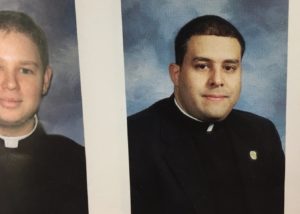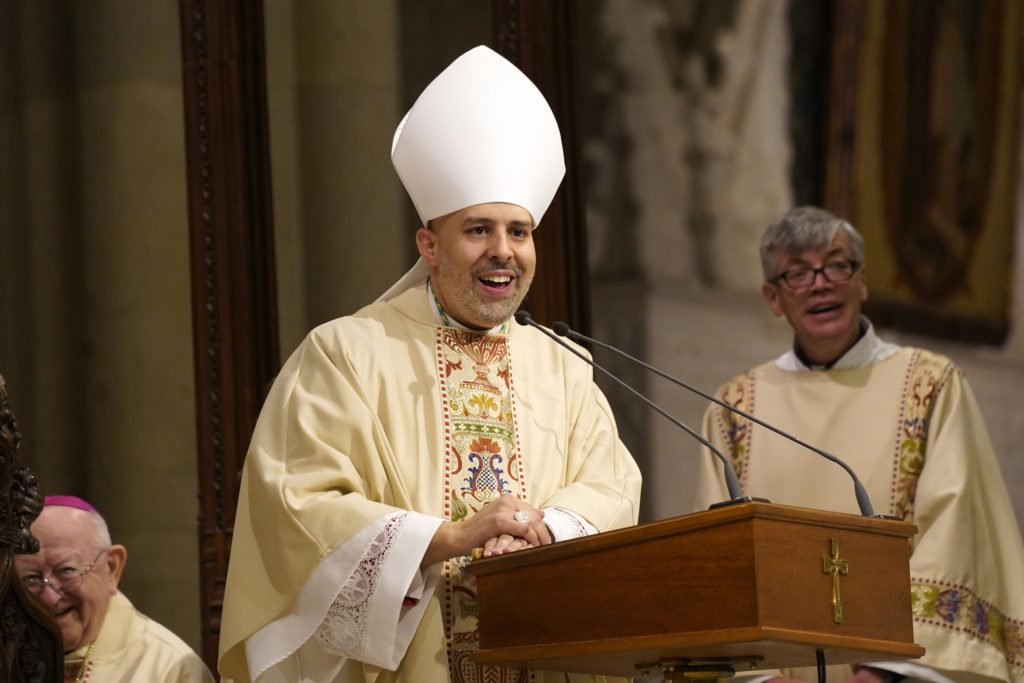When 46-year-old Bishop Joseph Espaillat takes the stage as a keynote speaker at the 2023 Los Angeles Religious Education Congress later this week, he’ll be bringing his city with him.
While Billy Joel once crooned about how New York is a state of mind, for Espaillat, it’s more of a flesh and bones sort of thing. New York City is in his walk and in his talk. He’s said that growing up, he learned three languages — English, Spanish, and Street.
But his visit to Southern California is also a homecoming of sorts.
The son of a military family, he was actually born not in the Big Apple but at Camp Pendleton, the Marine base north of San Diego. His family moved back to New York City shortly after, where he’s lived ever since. He was ordained a priest for the Archdiocese of New York when he was 25, serving in several inner-city parishes and becoming a leader in youth ministry there.
His reputation as a charismatic preacher with a gift for youth ministry brought him in 2017 to “ON FiRE,” a gathering of Catholic youth from Northern California and Nevada held in Vallejo, California, every year. It was his first time back in the Golden State in 40 years.
He still maintains one important bond with Southern California after all these years: He is a passionate Lakers fan (not Knicks, for reasons that will remain off the record), and even had the privilege of witnessing Kobe Bryant’s historic 61-point performance at Madison Square Garden in 2009.
Last year, Pope Francis named him an auxiliary bishop for the Archdiocese of New York at the age of 45, making him the youngest Catholic bishop in the country today and the Church’s first Dominican-American bishop. As an auxiliary, he helps oversee the archdiocese’s Bronx region and also serves as pastor of St. Anthony of Padua in the same borough.
Last November, he was in Long Beach to speak at the National Catholic Youth Conference (NCYC) with nearly 3,000 young Catholics from around the U.S. This week in Anaheim, he will give the keynote address (titled “Life in the Holy Spirit #GOALS”).
Espaillat spoke with Angelus about his thoughts on evangelizing young people, the problems with modern entertainment, and his hopes for a spiritual renewal at this week’s LA Congress.

What are you looking forward to about Congress?
I’m looking forward to being with the people, to ministering out there, and bringing a message of hope, and hopefully the fire of the Holy Spirit.
We’re living in critical times right now, and more than ever, people are looking for something different, something new. So hopefully we can light a fire in our Church, and all who come can in turn take that fire back to their respective communities and churches.
For you, what is it that makes these “critical times”?
Look around our world: There’s Ukraine and Russia and all the tension that’s there. We’ve got white balloons flying over our country and we don't even know what they are. The mass killings that keep happening in our country — in Texas, at Michigan State University, in Buffalo. These are not things that are happening elsewhere, they’re happening here in our country.
There’s despair because of what’s going on, and what’s happening in our world is just not normal. I just finished speaking to my spiritual director about this, how it’s just not good when life is not respected. We no longer respect life, beginning in the womb.
Meanwhile, people are looking for an answer. We just got over this pandemic, which threw us for a major loop. People are looking for hope, people are looking for change, but it’s not going to come from the government, from local politicians and leaders. There has to be one answer, and the answer is God, it’s the Lord.
You’ve been very active in youth ministry during your 20 years as a priest. During that time, have young people changed in terms of the problems they experience, the way they interact, etc.?
Yes. I can boil it down to two words: Identity crisis. There is a huge — and I mean huge — identity crisis. We no longer know who we are, nor whose we are.
People are trying to find themselves. Young people tell me, “Father, I’m trying to find myself,” and I keep on telling them, “That's the problem. Stop trying to find you and find him who made you. Find the Lord!”
That is the biggest thing. Years ago, I don’t think people had this identity crisis because there wasn’t such a crisis of values, of morals, of principles. But it’s like everything is crazy right now, because no one knows who they are, or whose they are.
Years ago, I heard someone say: If you don’t know who you are, the world will define you. And right now I don’t want to be defined by a world that is so confused.
So that’s the major thing right now. This big identity crisis is why there’s a lot of hopelessness, a lot of despair, a lot of anxiety, a lot of depression with the young people.

So in this situation, what are some ways the Church should be engaging with young people?
We should be calling them forth, to lift up their heads, to stop looking down and being downcast.
We need to give young people something better to listen to, better examples to look at, and not just talk about faith, but live faith. Give them a lived experience, a real lived experience of what faith is — what that encounter with the Lord is, and how God is not just some magician that we go to pray to and get three wishes from.
God is real and God wants our joy. God wants us to find our complete trust and love in him. “I came so that you might have life, and have life to the fullest,” Jesus says. What does that fullness of life look like? Are we presenting young people with what can happen if we give ourselves completely to the Lord, if we surrender to his will?
I think that unfortunately we’ve been deceived by the world and by modern society into talking about happiness and what makes me happy. Jesus didn’t come so we could be happy. Jesus came so that we may be joyful, full of joy. There’s a difference: Happiness is external but joy is internal, it’s the real thing.
That’s why Pope Francis speaks about the “joy of the Gospel.” Jesus says, “So that your joy may be complete.” We're not called to be happy. We're called to be joyful.
Anything good out there that Catholics should be paying attention to right now? Books, movies?
Movies are kind of lost right now, unfortunately.
It’s funny, because just last night I was talking to my young people at youth group about the life of St. Oscar Romero. I showed them three clips from the movie “Romero” (1989) and found out later that they went home last night and were blowing up their group chat about the movie. The youth minister said everybody was asking about the name of the movie because they wanted to show it to their parents.
It breaks my heart because we think they want to see all these other things, like “Captain Marvel,” “Wakanda Forever,” “Black Panther,” and the Marvel stuff like “Antman and the Wasp.” I mean, no offense to “Black Panther,” but don't we have something better to show our young people?
Movies, unfortunately, have lost it. You look at Hollywood and the way Hollywood was, but the reality is that the old movies that used to get nominated for awards had values, had principles.
In terms of books, there's a great book called “From Christendom to Apostolic Mission” (University of Mary, $13.95). Basically, the proposal of the book is that we’re no longer Christian as a society, we cannot consider ourselves a Christian society. We were never Catholic to begin with, we were really a Protestant nation.
Now we’re living in apostolic times and it’s a great challenge. The apostles had this challenge when they went out from the Holy Land to evangelize. There’s good and there’s bad to it, but we can’t keep living in the past and resting on our laurels. Things are different. The Church is different. We need to look at different structures, different models.

What’s an example of that?
If we look around our country, the Catholic school system for the most part is kind of shot, is struggling. We live off of this model that St. Elizabeth Ann Seton and St. John Neumann proposed more than two hundred years ago. And the reality is that that was a great model, but we’re still living off of the fumes of those models, and we need new models.
So what would that look like? Well, I ask, where are the modern-day St. Elizabeths and the modern-day St. John Neumanns? We can’t keep doing business as usual.
We are on mission mode and should focus our attention and resources on new religious education models that will help build up the parents and children together. Our focus should be on the “domestic church.” There are many factors that we need to consider.
The parish model is changing right before our very eyes. The parish where I serve here in the Bronx was founded by the future Archbishop Rummel for German immigrants because the Germans weren’t accepted at the time. You look at the beautiful architecture, the statues and the images, they’re all German.
But this is a Hispanic and Black neighborhood now. Are we even relating to the people in our neighborhood? And then when our people don’t come to Mass, can we blame them?
Sure, there are some people who don’t want anything to change, don’t want to push forward. They don’t want St. Charles Lwanga and companions to be up on the fresco, or St. Oscar Romero, or St. José Luis Sánchez del Río. But these are the more modern-day saints, people we have to look to.
Anything else to add?
I’m really looking forward to coming out to LA. I think the theme is magnificent: “Embrace Grace.” It’s right up the alley of what we need right now.
People need to know that we need to live in God’s grace, right? And to embrace it. And how do we embrace it? By calling forth on the power of the Holy Spirit — and you don’t want to miss it! You're gonna want to be there!
So, whoever this is going out to, something new is gonna happen. I’m sure you’ve paid attention to what’s going on in Asbury, Kentucky, right now. It’s a revival, and it shows that people want more, people need more. We have the fullness of truth in our Church in the sacraments, but I think we’ve gotten way too comfortable.
It’s the beginning of Lent, and I think people’s lives are going to get rocked at Congress. This is going to be a beautiful event for everybody who goes, because if we learn how to embrace grace, then change will happen in the world. That’s what’s so desperately needed.

